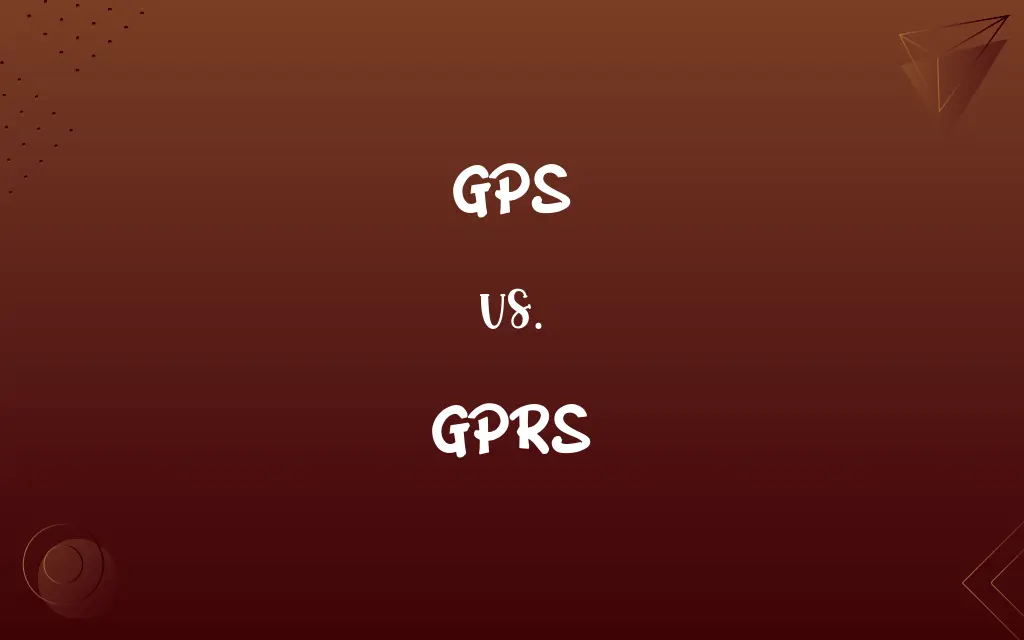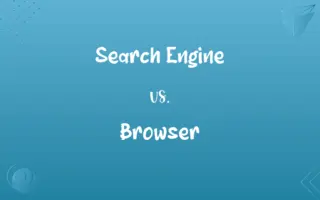GPS vs. GPRS: Know the Difference

By Shumaila Saeed || Published on February 9, 2024
GPS (Global Positioning System) provides geographical location using satellites, while GPRS (General Packet Radio Service) is a mobile data service for wireless communication.

Key Differences
GPS, or Global Positioning System, is a satellite-based navigation system that provides location and time information globally. GPRS, or General Packet Radio Service, is a packet-oriented mobile data standard on cellular networks. GPS is primarily used for location tracking and navigation, whereas GPRS enables data services like internet access over mobile networks.
Shumaila Saeed
Feb 09, 2024
The GPS system relies on a constellation of satellites orbiting the Earth to pinpoint a receiver's location, offering high-precision geographical positioning. In contrast, GPRS uses terrestrial mobile phone networks to transmit data, thereby providing internet connectivity and data communication services. GPS's functionality is limited to location services, while GPRS facilitates a broader range of data communication.
Shumaila Saeed
Feb 09, 2024
GPS technology is utilized in various applications, including mapping, navigation, and timing services, in both civilian and military domains. GPRS, on the other hand, is essential for mobile internet, MMS (Multimedia Messaging Service), and other data-based mobile applications. GPS is indispensable for accurate positioning, whereas GPRS plays a key role in mobile communication.
Shumaila Saeed
Feb 09, 2024
The accuracy of GPS can be affected by factors like atmospheric conditions, signal blockage, and satellite geometry. GPRS’s performance is influenced by network coverage, the number of users, and the capability of the mobile device. GPS provides consistent location accuracy worldwide, while GPRS's effectiveness depends on cellular network infrastructure.
Shumaila Saeed
Feb 09, 2024
GPS receivers are commonly found in vehicles, smartphones, and various navigation devices. GPRS technology is embedded in mobile phones and is a cornerstone for 2.5G and 3G cellular networks. While GPS is synonymous with location tracking, GPRS is associated with wireless data communication.
Shumaila Saeed
Feb 09, 2024
ADVERTISEMENT
Comparison Chart
Primary Function
Provides global location and timing information.
Offers packet-based mobile data services.
Shumaila Saeed
Feb 09, 2024
Technology Base
Satellite-based navigation system.
Cellular network data service.
Shumaila Saeed
Feb 09, 2024
Usage Applications
Navigation, mapping, timing services.
Mobile internet, MMS, data communication.
Shumaila Saeed
Feb 09, 2024
Dependency Factors
Satellite visibility, atmospheric conditions.
Network coverage, cell tower proximity.
Shumaila Saeed
Feb 09, 2024
Common Devices
Smartphones, navigation systems, tracking devices.
Mobile phones, cellular modems.
Shumaila Saeed
Feb 09, 2024
ADVERTISEMENT
GPS and GPRS Definitions
GPS
GPS technology is used in various location-based applications.
GPS-enabled smartphones help users find nearby restaurants.
Shumaila Saeed
Jan 24, 2024
GPRS
GPRS is a 2.5G technology for mobile data transmission.
GPRS allows sending emails from mobile devices without Wi-Fi.
Shumaila Saeed
Jan 24, 2024
GPS
GPS operates through a network of Earth-orbiting satellites.
Delivery services utilize GPS for real-time package tracking.
Shumaila Saeed
Jan 24, 2024
GPRS
GPRS is a standard for wireless communication in mobile phones.
Users send pictures via MMS using GPRS on their cell phones.
Shumaila Saeed
Jan 24, 2024
GPS
GPS is a satellite-based navigation system for determining precise location.
Hikers use GPS to navigate trails in remote areas.
Shumaila Saeed
Jan 24, 2024
ADVERTISEMENT
GPRS
GPRS is an essential component of mobile communication systems.
Emergency services coordinate responses using GPRS for communication.
Shumaila Saeed
Jan 24, 2024
GPS
GPS provides global positioning and timing information.
Airlines use GPS for accurate flight tracking and navigation.
Shumaila Saeed
Jan 24, 2024
GPRS
GPRS enables internet and multimedia services over cellular networks.
Travelers access online maps on their smartphones through GPRS.
Shumaila Saeed
Jan 24, 2024
GPS
GPS is essential for modern navigation and mapping.
Car navigation systems rely on GPS for turn-by-turn directions.
Shumaila Saeed
Jan 24, 2024
GPRS
GPRS supports a wide range of mobile and wireless applications.
IoT devices transmit data using GPRS for remote monitoring.
Shumaila Saeed
Jan 24, 2024
GPS
A navigational system involving satellites and computers that can determine the latitude and longitude of a receiver on Earth by computing the time difference for signals from different satellites to reach the receiver
Shumaila Saeed
Jan 24, 2024
Repeatedly Asked Queries
What is the main function of GPS?
Providing precise location and timing information.
Shumaila Saeed
Feb 09, 2024
How does GPS determine location?
Through signals from a network of satellites.
Shumaila Saeed
Feb 09, 2024
Can GPS work without internet?
Yes, it doesn't require an internet connection.
Shumaila Saeed
Feb 09, 2024
What devices commonly use GPS?
Smartphones, cars, and various navigation devices.
Shumaila Saeed
Feb 09, 2024
Is GPRS still in use?
Yes, especially in areas with limited 3G or 4G coverage.
Shumaila Saeed
Feb 09, 2024
Are GPS signals affected by weather?
They can be, especially by severe atmospheric conditions.
Shumaila Saeed
Feb 09, 2024
Do all smartphones have GPS?
Most modern smartphones come equipped with GPS.
Shumaila Saeed
Feb 09, 2024
Can GPRS be used for voice calls?
Yes, but it's primarily designed for data transmission.
Shumaila Saeed
Feb 09, 2024
Can GPRS provide location services?
Not directly; it requires GPS for precise location.
Shumaila Saeed
Feb 09, 2024
What affects GPRS performance?
Network coverage and the number of concurrent users.
Shumaila Saeed
Feb 09, 2024
Is GPRS secure?
It has standard security, but not as secure as modern 3G or 4G networks.
Shumaila Saeed
Feb 09, 2024
Share this page
Link for your blog / website
HTML
Link to share via messenger
About Author
Written by
Shumaila SaeedShumaila Saeed, an expert content creator with 6 years of experience, specializes in distilling complex topics into easily digestible comparisons, shining a light on the nuances that both inform and educate readers with clarity and accuracy.








































































